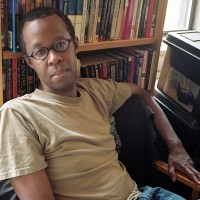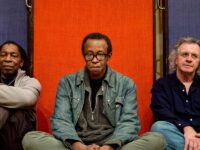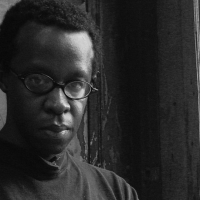As I listen to pianist Matthew Shipp’s latest release, there’s a part of me that finds it difficult to not be unduly influenced by the knowledge that Shipp thinks that Stanley Crouch is a horse’s ass. That influence is hard to ignore, since one of the qualities of Shipp’s pronouncements is total honesty. A beautiful and rare thing.
I bring up Crouch (though I sort of hate to do it) because the straight-jacketed rules he tends to apply about what’s right or not about music can end up serving as needless filters, keeping certain avenues of creativity out for the sake of preserving what feels like historical correctness.
Root Of Things, out today on Relative Pitch Records, finds Shipp and his trio visiting straight-ahead (for Shipp, that is) environments as well as more “out” constructs…often during the same song. Historical correctness be damned! “Jazz It” is a great example: it comes out of the gate with Michael Bisio’s bass swinging hard as Shipp drops a long series of chords on top. But about halfway through, the tempo jumps up a few notches and before long, it sounds like the keys just might come flying off the piano. Shades of Cecil Taylor…and shades of Monk too.
On the more “out” side, there’s “Path,” which begins with a long Michael Bisio bass solo that edges past its pensive start, gradually morphing into a call and response workout between bowed and regular lines. When Shipp and drummer Whit Dickey finally enter, the piano at first mirrors the bass line. But when Shipp takes off in a different direction, it feels like the concept of the piece has crystallized right before our ears.
The musician’s sense of each other here is quite dramatic. The opening parts of the title track exhibit a gentle push-pull rhythm, with each player reacting to the other. Put the idea of a piano trio out of your head for a second and listen to how Bisio takes Shipp’s arpeggios and twists them into entirely different shapes. “Pulse Code” does something similar, though this time with Whit Dickey leading off on the drums, teasing out a framework over several minutes before the piano and bass come in to begin spinning off a series of jagged and high energy phrases. The ending, a long, reverberant piano chord, is a nice touch.
Root of Things ends with “Solid Circut,” a two-part track on which Shipp starts out solo, folding a long series of note clusters back into themselves. Controlled chaos ensues when Bisio and Dickey enter, forcing Shipp’s piano into overdrive. It’s an exhilarating way to finish things off, historical correctness be damned!
[amazon_enhanced asin=”B00EBDXZ54″ /] [amazon_enhanced asin=”B004GHYCHA” /] [amazon_enhanced asin=”B00AG4745Y” /] [amazon_enhanced asin=”B006UFHDCM” /] [amazon_enhanced asin=”B00004SGX8″ /] [amazon_enhanced asin=”B00007L7LX” /] [amazon_enhanced asin=”B00005UWLE” /] [amazon_enhanced asin=”B000089CJE” /] [amazon_enhanced asin=”B00CCGWJ5E” /] [amazon_enhanced asin=”B00FA35VQA” /]
Root of Things goes on sale today at the Relative Pitch Records
- Why the Rolling Stones’ Harrowing ‘Gimme Shelter’ is Still Revealing New Depths - November 18, 2024
- How Talking Heads’ ‘Fear of Music’ Opened Up a World of Art and Sound - August 5, 2024
- How Deep Cuts Propelled Bruce Springsteen’s ‘Born in the U.S.A.’ - June 4, 2024




